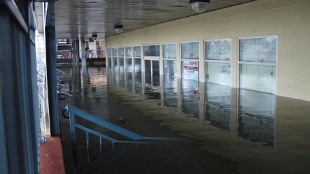 Flooding caused by Hurricane Sandy on Emmons Ave, Brooklyn, NYWikimedia, VicpetersIn 2009, the New York City Panel on Climate Change (NPCC) issued dire warnings to residents of the Big Apple that they'd be feeling the effects of global warming sooner rather than later. "In the coming decades, our coastal city will most likely face more rapidly rising sea levels and warmer temperatures, as well as potentially more droughts and floods, which will all have impacts on New York City’s critical infrastructure,” said NPCC co-chair William Solecki, a geographer at the CUNY Institute for Sustainable Cities at Hunter College, said in a February 2009 statement announcing the report. "Taking steps now to adapt to these impacts will reduce their potential consequences in the future."
Flooding caused by Hurricane Sandy on Emmons Ave, Brooklyn, NYWikimedia, VicpetersIn 2009, the New York City Panel on Climate Change (NPCC) issued dire warnings to residents of the Big Apple that they'd be feeling the effects of global warming sooner rather than later. "In the coming decades, our coastal city will most likely face more rapidly rising sea levels and warmer temperatures, as well as potentially more droughts and floods, which will all have impacts on New York City’s critical infrastructure,” said NPCC co-chair William Solecki, a geographer at the CUNY Institute for Sustainable Cities at Hunter College, said in a February 2009 statement announcing the report. "Taking steps now to adapt to these impacts will reduce their potential consequences in the future."
The panel, which comprised top climate change scientists and academics and was funded by the Rockefeller Foundation, calculated that New York City would experience a "1-in-10 year coastal flood about once every 1 to 3 years," and a "1-in-100 year coastal flood about once every 15 to 35 years." The flooding caused by Hurricane Sandy's storm surge topped out at 13 feet in lower Manhattan, a record for the city.
"The climate change projections developed by our expert panel put numbers to what we already know—climate change is real and could have serious consequences for New York if we don’t take action," said NYC Mayor Michael Bloomberg in the statement announcing the report. "Planning for climate change today is less expensive than rebuilding an entire ...
















